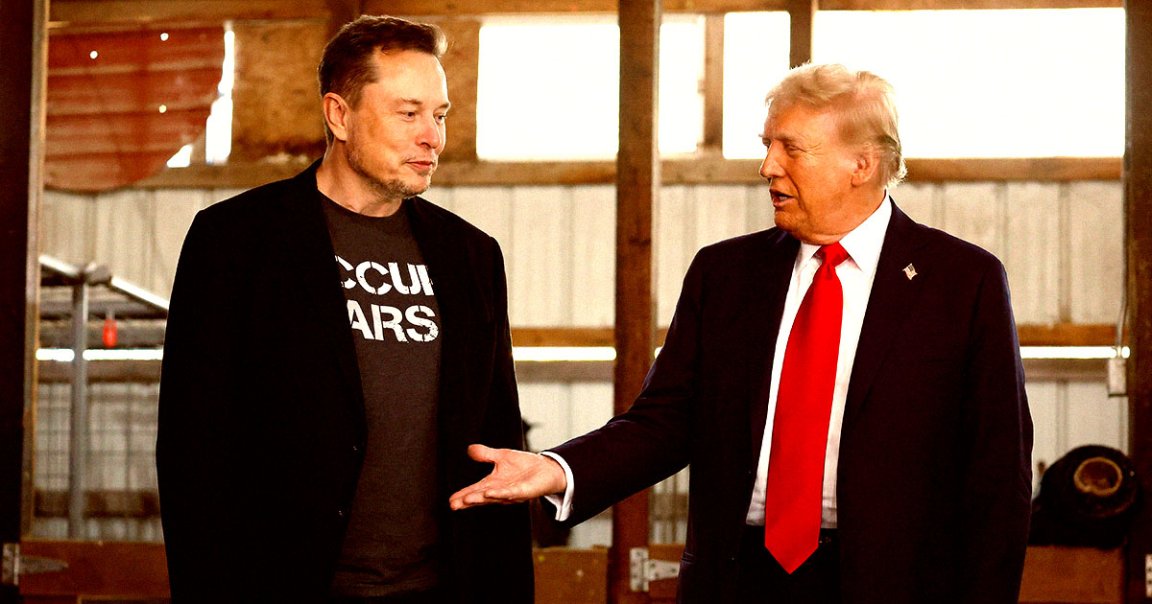
Now that SpaceX CEO Elon Musk and president Donald Trump are no longer seeing eye to eye, it sounds like the White House is working to undercut the richest man in the world’s revenue from Washington.
As the Wall Street Journal reports, Trump aides initiated a review of SpaceX contracts with the federal government to identify potential waste — pointed scrutiny not unlike the so-called Department of Government Efficiency helmed by Musk himself prior to his ousting from the Trump administration.
However, the efforts were largely in vain, since most of the contracts were found to be critical to the Defense Department and NASA, sources told the WSJ.
Perhaps most urgently for Musk, the Trump administration is expanding its search to look for alternative contractors for its planned Golden Dome missile defense system, Reuters reports. SpaceX was deemed the clear frontrunner before Trump and Musk had their falling out.
The reporting highlights the tremendous amount of influence Musk maintains within the federal government, despite his imploded relationship with the president. SpaceX and Tesla have enjoyed billions of dollars in subsidies and government contracts, allowing them to survive several major impasses and budget crunches.
In short, it will be anything but easy for Trump to cut off Musk’s space firm, as the government has become greatly reliant on SpaceX satellite and rocket tech.
In emails sent days after Musk and Trump’s feud turned into a bitter online shouting match in early June, the General Services Administration asked the Defense Department and NASA to lay out in detail all of SpaceX’s contracts, the WSJ reports.
The goal was to gauge SpaceX’s performance and whether competitors could complete the jobs for less money.
In the short term, most deals were deemed too vital for the Defense Department and NASA to jeopardize. However, a source told the WSJ that Musk’s space company could face continued scrutiny.
Meanwhile, Trump’s long-touted “Golden Dome” missile defense shield project is actively looking for alternatives to SpaceX.
However, even Musk has argued that working on such a project would be far too much of a distraction.
“SpaceX has not tried to bid for any contract in this regard,” he tweeted back in April. “Our strong preference would be to stay focused on taking humanity to Mars.”
According to Reuters, competitor Amazon’s Project Kuiper — in the empire of Musk’s arch-nemesis Jeff Bezos — could emerge as a new frontrunner for the defense system.
The situation highlights how much of a headstart SpaceX has carved out for itself, becoming the de facto provider of access to space for both NASA astronauts and national defense satellites. Its reusable rockets, in particular, have greatly lowered costs, allowing it to offer launches at significantly reduced prices.
Both sides hold cards that tie them together despite the fighting. Despite Musk’s greatly deteriorated relationship with Trump, SpaceX still holds several dozen national security-related launch contracts. Its Crew Dragon has turned into the only viable way for NASA to send astronauts to the International Space Station, while its Starshield project is allowing the military to build out a spy satellite network.
In other words, try as he might, Trump will have a very hard time getting rid of Musk’s SpaceX any time soon.
More on SpaceX: Government Gives Elon Musk Permission to Detonate Rockets Over a Sacred Hawaiian Island